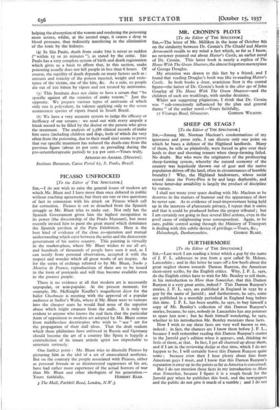PICASSO UNFROCKED
[To the Editor of THE SPECTATOR.] do not wish to raise the general issues of modern art which Mr. Blunt and I have more than once debated in public without reaching agreement, but there are one or two questions of fact in connexion with his attack on Picasso which call for correction. Picasso is not so detached from the Spanish struggle as Mr. Blunt tries to make out. Not only has the Spanish Government given him the highest recognition in its power (the directorship of the Prado Museum), but more recently invited him to paint the great mural which dominates the Spanish pavilion at the Paris Exhibition. Here is the best kind of evidence of the close co-operation and mutual understanding which exist between the artist and the democratic government of his native country. This painting is virtually in the market-place, where Mr Blunt wishes to see all art, and hundreds of thousands of people have seen it and, as I can testify from personal observation, accepted it with the respect and wonder which all great works of art inspire. As for the series of etchings referred to by Mr. Blunt, Sue& y Mentira de Franco, reproductions of these are to be issued in the form of postcards and will thus become available even to the poorest people.
There is no evidence at all that modern art is necessarily unpopular, or non-popular. At the present moment, for example, Mr. McKnight Kauffer's magnificent decor for the ballet Checkmate is meeting with the approval of a popular audience at Sadler's Wells, where if Mr. Blunt were to venture into the cheaper seats he would find none of the superior abuse which might emanate from the stalls. It is only too evident to anyone who knows the real facts that the particular form of opposition to modern art adopted by Mr. Blunt comes from middle-class doctrinaires who wish to " use " art for the propagation of their dull ideas. That the drab realism which these philistines have enforced in Russia and Germany should become the art of a country like Spain is happily a contradiction of its innate artisdc spirit too improbable to entertain seriously.
One furth= point : Mr. Blunt tries to discredit Picasso by picturing him as the idol of a set of emasculated aesthetes. But on the contrary the people associated with Picasso, either as personal friends or as disinterested supporters of his art, have had rather more experience of the actual horrors of war than Mr. Blunt and other ideologists of his generation.—
3 The Mall, Parkhill Road, London, N.W.3.






















































 Previous page
Previous page